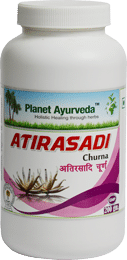HERBAL REMEDIES, NATURAL TREATMENT FOR PREMATURE EJACULATION - ATIRASADI CHURNA
Many males are silently suffering from sexual dysfunctions. They usually go for unreliable products available in market to resolve the problem of premature ejaculation. Though these products may end up you with adverse effects on health.
After a lot of research on various Ayurvedic herbs and cures for premature ejaculation, our research team formulated a formula which proved excellent herbal remedy for premature ejaculation. The product was named on ancient Ayurvedic herb for premature ejaculation treatment called "Atirasa". "Ati" means full of and "Rasa" means juice or full of power. The various herbs for premature ejaculation were utilized to make this unique herbal formulation called Ati-Ras-Adi Churna (Churna means herbs powder).
This herbal formulation helps to improve male reproductive system. Some of the herbs are effective herbal remedies which are described in ancient Indian literature like "kamasutra" as well as other classical texts. These herbal remedies are time tested which are the rarest and costly ingredients like Indian Ginseng, Tribulus terrestris, Asparagus, Shilajit, Saffron & Musli etc. were used by kings in India during ancient times. When such effective herbs for premature ejaculation and erectile dysfunction are available then why to take synthetic, chemical based drugs. Our products are all natural, safe & economical. Free from side effects, chemicals or preservatives.
ATIRASADI CHURNA – NATURE'S GIFT ! !
- 100 % Natural product containing 13 rare herbs
- Formulated by MD Ayurveda expert – Dr. Vikram Chauhan
- Helps to maintain a healthy reproductive system
- 100% vegetarian formula
- Enhances Shukra Dhatu (Semen)
- Free from chemicals, preservatives, starch, additives, colors, yeast, binders & fillers
- Many age old herbs are described in ancient Ayurvedic texts especially in the "Vajikarna” and “Rasayana" chapter of Charak Samhita – A text book written by ancient sage known as Charak in 1500 B.C.
- These chapters are mainly focused in explaining role of various herbs in maintaining physical vitality and sexual health.
Pack Size - 1 Bottle – 200gm
Dosage - Consume 1 teaspoonful with plain water, after meals. Twice daily is recommended.
To buy Atirasadi Churna, please visit store.planetayurveda.com/products/atirasadi-churna
AYURVEDIC ENERGETICS OF ATIRASADI CHURNA
V – P = K +
- Effects on Vata Dosha – Pacifies Vata dosha
- Effects on Pitta Dosha – Balances Pitta Dosha, does not aggravate Pitta as it is a balanced formulation with herbs having balancing acts on Tridosha
- Effect on Kapha Dosha – Nourishes Kapha Dosha
- Effects on Dhatu - Supports Dhatu Function and normal metabolism of the tissues
INGREDIENTS OF ATIRASADI CHURNA
| S. No. | Indian Name | English Name | Latin Name | Qty |
| 1. | Safed Musli | Musli | Chlorophytum borivilianum | 30 gm |
| 2. | Kali Musli | Black Musale | Curculigo orchioides | 20 gm |
| 3. | Semal Musli | Silk Cotton Tree | Salmalia malabarica | 20 gm |
| 4. | Gokshura | Puncture twine | Tribulus terrestris | 20 gm |
| 5. | Shatavari | Asparagus | Asparagus racemosus | 20 gm |
| 6. | Ashwagandha | Winter Cherry | Withania somnifera | 20 gm |
| 7. | Akarkara | Pellitory | Anacyclus pyrethrum | 20 gm |
| 8. | Vidari Kand | Hawaiian Baby Woodrose | Pueraria tuberosa | 10 gm |
| 9. | Varahi Kand | Wild Yam | Dioscorea bulbifera | 10 gm |
| 10. | Safed Behmen | Centaurea | Centaurea behen | 10 gm |
| 11. | Jaiphal/Javitri | Nutmeg/Mace | Myristica fragrans | 10 gm |
| 12. | Taalmakhana | Hygrophila | Hygrophila spinosa | 05 gm |
| 13. | Kesar | Saffron | Crocus sativus | 05 gm |
1. SAFED MUSLI (CHLORPHYTUM BORIVILLIANUM)
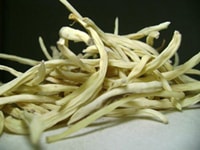 This is a small herb belonging to Asparagaceae family. The plant is mentioned in many chapters of restorative health in ancient Ayurvedic texts. Roots of the plant are used, which are like small tubers. Safed Musli is very popular in India, Afghanistan, China and Pakistan since many centuries. The tubers are rich in saponnins and natural anti-oxidants. Safed Musli is described in ancient Ayurvedic text called Raj Nighantu.
This is a small herb belonging to Asparagaceae family. The plant is mentioned in many chapters of restorative health in ancient Ayurvedic texts. Roots of the plant are used, which are like small tubers. Safed Musli is very popular in India, Afghanistan, China and Pakistan since many centuries. The tubers are rich in saponnins and natural anti-oxidants. Safed Musli is described in ancient Ayurvedic text called Raj Nighantu.
Sanskrit Verse -
" Madhura, Sheeta, Vrishya, Pushti Bal Prada
Picchila, Kafda, Pitta, Dah Shram hara Pra"
Translation –
"Sweet, Cold, Sexual tonic, Strength and Stamina promoter, Unctuous, increases Kapha dosha, controls Pitta, heat and fatigue.*"
Raj Nighantu First Volume –Part VI- 317-18
Raja nighantu is one of the noted book on herbal pharmacognosy and pharmacology. The subject is called "Dravyaguna" in Ayurveda (Herbal Pharmacology).
The name Raja nighantu itself reveals that it is the king of all such texts relating to literature on Indian herbs. Narahari pandita is the author of this text. There is controversy with regards to time of Rajanighantu which ranges between 13th century to 17th century.
AYURVEDIC ENERGETICS OF SAFED MUSLI (ENGLISH AND IN HINDI)
| English | English | Hindi | Hindi |
| Taste | Sweet | Rasa | Madhur |
| Physical property | Heavy, unctuous | Guna | Guru, Snigdh |
| Potency | Cold | Virya | Sheet |
| Metabolic property | Sweet | Vipaka | Madhur |
2. KALI MUSLI – CURCULIGO ORCHIODES
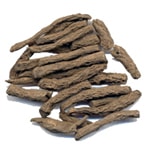 The herb is also known as "Taalmooli" in Sanskrit language. It belongs to Hypoxidaceae family and the Latin name is Curculigo orchioides.
The herb is also known as "Taalmooli" in Sanskrit language. It belongs to Hypoxidaceae family and the Latin name is Curculigo orchioides.
It's a small shrub with thick leaves. The herb grows mainly in southern India and in Himalayan Mountains up to height of 6000 ft. It is rich in natural tannins. The roots are used for their medicinal purpose in Ayurveda. It is described in Ayurvedic text of herbal pharmacology "Bhavprakash Nigantu".
Sanskrit Verse -
"Musli madhura vrishya viryoashna brinhani guru
Tikta rasayani hanti gudjanyanilam tatha"
Bhav Prakash Nighantu – 1600 A.D.
English Translation –
"Musli is sweet, aphrodisiac, stamina enhancer, heavy, bitter, Rejuvenative and balances Air element in the colon"
AYURVEDIC ENERGETICS OF SAFED MUSLI (ENGLISH AND IN HINDI)
| English | English | Hindi | Hindi |
| Taste | Sweet, Bitter | Rasa | Madhura, Tikta |
| Physical property | Heavy, Smooth, Slimy | Guna | Guru, Snigdha, Pichchil |
| Potency | Hot | Virya | Ushna |
| Metabolic property | Sweet | Vipaka | madhura |
3. SEMAL MUSELI – SILK COTTON TREE – SALMALIA MALABARICA
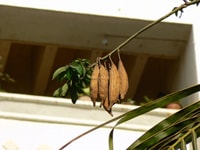 This herb belongs to Bombacaceae family.
It is a huge tree that grows as tall as 125 feet in height. Bark and stems bear sharp spicules. The roots of the juvenile plants (1 -2 years of age) are used as semal museli.
This herb belongs to Bombacaceae family.
It is a huge tree that grows as tall as 125 feet in height. Bark and stems bear sharp spicules. The roots of the juvenile plants (1 -2 years of age) are used as semal museli.
"Mochrasa" is a resinous extract hat seeps through its bark.
This tree is found all over in India, growing abundantly in the forest areas.
The extracts obtained from semal museli contain Tannic acid and Gallic acid as active chemicals.
A distinct explanation of this plant is present in many Ayurvedic books on pharmacology of herbs. One of these is "Rajnighantu" in which a very precise but apt explanation of safed museli can be found.
Sanskrit verse –
"Kashayashcha laghu snigdha shukra shleshma vivardhana"
Rajnighantu – (In between 13th to 17th century)
Translation –
"Astringent, light, smooth, enhances semen and phlegm."
AYURVEDIC ENERGETICS OF SEMAL MUSELI (ENGLISH AND IN HINDI)
| English | English | Hindi | Hindi |
| Taste | Sweet | Rasa | Madhura |
| Physical property | Light, Smooth, Slimy | Guna | Laghu, Snigdha, Pichchil |
| Potency | Cold | Virya | Sheet |
| Metabolic property | Sweet | Vipaka | madhura |
4. GOKSHUR – TRIBULUS TERRESTRIS
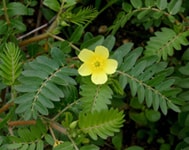 It is a common shrub belonging to the "Zygophyllaceae" family which commonly grows all across India. The Latin name of this plant is Tribulus terrestris. This herb bears sharp spicules which are strongly piercing in nature.
It is a common shrub belonging to the "Zygophyllaceae" family which commonly grows all across India. The Latin name of this plant is Tribulus terrestris. This herb bears sharp spicules which are strongly piercing in nature.
Gokshur is a source of natural tannins, resins, aromatic oils, glycosides and plant alkaloids namely harman and harmine.
In detail explanation this herb can be found in "Bhavprakash nighantu", an ancient Ayurvedic text. The following excerpt from the book rightly explains the many qualities of this herb.
Sanskrit verse -
"Gokshur sheetal swadurbalkridvastishodhana.
Madhuro deepano vrishya pushtidashchashmarihara"
Bhavprakash nighantu -16oo A.D.
English translation –
"Gokshura herb is cold, palatable, stamina enhancer, urinary bladder cleanser, sweet, digestive, aphrodisiac, fulfilling, prevents stone formation."
AYURVEDIC ENERGETICS OF GOKSHUR (ENGLISH AND IN HINDI)
| English | English | Hindi | Hindi |
| Taste | Sweet | Rasa | Madhura |
| Physical property | Heavy, Smooth | Guna | Guru, Snigdha |
| Potency | Cold | Virya | Sheet |
| Metabolic property | Sweet | Vipaka | Madhura |
5. SHATAVARI– ASPARAGUS RACEMOSUS
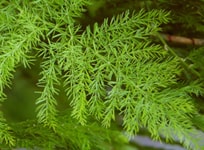 The Latin name of the plant is "Asparagus racemosus". It is a climber with numerous needle – like spicules. It belongs to the "Asparagaceae" family. As per the name "shatavari" means "the one that cures hundreds of diseases".
The Latin name of the plant is "Asparagus racemosus". It is a climber with numerous needle – like spicules. It belongs to the "Asparagaceae" family. As per the name "shatavari" means "the one that cures hundreds of diseases".
The plant grows widely in the Indian terrain up to the Himalayas at a height of 4000 feet above sea level.
It also grows in the neighboring countries of Sri Lanka and Nepal.
Detailed explanation of this herb can be found in Dhanvantri nighantu, a legendary book having a vast literature on herbs.
Sanskrit verse –
"Shatavari hima tikta rase swadu kshayasrajit.
Vatapittahari vrishya rasyanavara smrita"
Dhanvantri nighantu – 13th century A.D.
English translation –
"Shatavari is cold, bitter, sweet, wins over physical weakness. Pacifies vata and pitta body energy, aphrodisiac and rejuvenating."
AYURVEDIC ENERGETICS OF SHATAVARI (ENGLISH AND IN HINDI)
| English | English | Hindi | Hindi |
| Taste | Sweet, Bitter | Rasa | Madhura, Tikta |
| Physical property | Heavy, Smooth | Guna | Guru, Snigdha |
| Potency | Cold | Virya | Sheet |
| Metabolic property | Sweet | Vipaka | Madhura |
6. ASHWAGANDHA–WINTERCHERRY-WITHANIA SOMNIFERUM
 It is a dense and hairy shrub with the Latin name "Withania somnifera". The plant belongs to "Solanaceae" family. Leaves are simple, round to oval in shape.
It is a dense and hairy shrub with the Latin name "Withania somnifera". The plant belongs to "Solanaceae" family. Leaves are simple, round to oval in shape.
The word "Ashwagandha" in Hindi means "smell of a sweating horse".
It can be found growing in the North –Western parts of India and the Himalayas. Bhavprakash nighantu has detailed explanation of the numerous properties of this herb. Here is a quote from Bhavprakash nighantu.
Sanskrit verse –
"Ashwagandhanilshleshma shvitra shoth kshayapaha
Balya rasayani tikta kashayoshnaatishukrala"
Bhavprakash nighantu – 1600 A.D.
English translation -
"Ashwagandha fights vata (space), kapha (phlegm) body energies, skin diseases, inflammation and weight loss. It boosts stamina, has rejuvenating properties and is bitter, astringent, and hot and promotes secretion of semen".
AYURVEDIC ENERGETICS OF ASHWAGANDHA (ENGLISH AND IN HINDI)
| English | English | Hindi | Hindi |
| Taste | Bitter, Pungent, Astringent | Rasa | Tikta, Katu, Kashaya |
| Physical property | Light, Smooth | Guna | Laghu, Snigdha |
| Potency | Hot | Virya | Ushna |
| Metabolic property | Pungent | Vipaka | Katu |
7. AKARKARA – ANACYCLUS PYRETHRUM
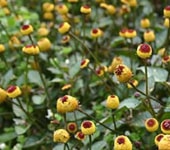 It is a hairy shrub with the Latin name "Anacyclus pyrethrum". The plant belongs to "Asteraceae" family. It has not been well described in the ancient Ayurveda texts. Only later in the books like "Bhavprakash" and "Gadanigraha" both great literary works on plants, the description of Akarkara can be found. The plant is quite sturdy as it can remain potent for as long as 7 years.
It is a hairy shrub with the Latin name "Anacyclus pyrethrum". The plant belongs to "Asteraceae" family. It has not been well described in the ancient Ayurveda texts. Only later in the books like "Bhavprakash" and "Gadanigraha" both great literary works on plants, the description of Akarkara can be found. The plant is quite sturdy as it can remain potent for as long as 7 years.
This plant is a native to the Arabian countries and grows in Northern Africa, Arabia and Syria. It is rarely found growing in India.
"Shaligram nighantu" is one of the many texts available on plants and their properties. Akarkara has been discussed briefly in this book.
Sanskrit verse –
"Akarakarabhashchaeva Kallakoth hiyakallaka.
Akallak koshno viryena balkrit katuko mat.
Pratishyayam cha shotham cha vatam cheva vinashayet"
Shaligram nighantu – 19th century A.D.
(Shaligram nighantu is considered to be the last pharmacological dictionary of the 19th century)
Translation –
"Akarkarabh and akallak are the synonyms of akarkara. It has a hot potency, improves stamina, pungent. It pacifies vata body energy, inflammation and sinusitis."
AYURVEDIC ENERGETICS OF AKARKARA (ENGLISH AND IN HINDI)
| English | English | Hindi | Hindi |
| Taste | Pungent | Rasa | Katu |
| Physical property | Dry, Piercing | Guna | Ruksha, Tikshna |
| Potency | Hot | Virya | Ushna |
| Metabolic property | Pungent | Vipaka | Katu |
8. VIDARIKANDA– INDIAN KUDJU - PUERERIA TUBEROSA
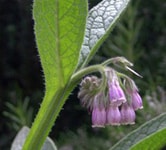 The Latin name of the plant is "Pueraria tuberosa". It belongs to the "Leguminosae" family. Vidarikanda is also known as "Indian kudju". It is a woody climber with stem modified as tuber. The herb has a large coiling and climbing vine with huge tuberous roots.
The Latin name of the plant is "Pueraria tuberosa". It belongs to the "Leguminosae" family. Vidarikanda is also known as "Indian kudju". It is a woody climber with stem modified as tuber. The herb has a large coiling and climbing vine with huge tuberous roots.
The tubers are rich in carbohydrates and proteins.
It is found all over in India, in the Himalayan region as well.
"Bhavprakash nighantu" vividly explains about this herb with all its properties.
Sanskrit verse –
"Vidari madhura snigdha brihani stanya shakrada.
Sheeta swarya mutrala cha jivani balvarnada.
Guru Pittasrapavandahana hanti rasayanam"
Bhavprakash nighantu – 1600 –A.D.
Translation –
"Vidarikanda is sweet, smooth, promotes weight gain, and enhances breast milk production and semen. Cold, improves speech, diuretic, improves vitality, and enhances body strength and complexion. Heavy, pacifies pitta (fire) and vata (air) body energies and is rejuvenating."
AYURVEDIC ENERGETICS OF VIDARIKANDA (ENGLISH AND IN HINDI)
| English | English | Hindi | Hindi |
| Taste | Sweet | Rasa | Madhura |
| Physical property | Heavy, Smooth | Guna | Guru, Snigdha |
| Potency | Cold | Virya | Sheet |
| Metabolic property | Sweet | Vipaka | Madhura |
9. VARAHIKANDA– DIOSCOREA BULBIFERA
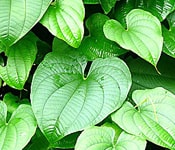 It is commonly known as "Air potato". This is a rapidly twining herbaceous vine with aerial tubers and may have an underground tuber as well. Due to the presence of large aerial tubers or bulbils, it is known as Dioscorea "bulbifera" and "air potato".
It is commonly known as "Air potato". This is a rapidly twining herbaceous vine with aerial tubers and may have an underground tuber as well. Due to the presence of large aerial tubers or bulbils, it is known as Dioscorea "bulbifera" and "air potato".
The herb belongs to "Dioscoreaceae" family and its Latin name is Dioscorea bulbifera.
It is found in the Himalayan Mountains of India up to the height of 6000 feet above sea level.
The tubers of air potato contain many albuminoids, carbohydrates and fats. "Kaideva nighantu" is a pharmacological dictionary in which varahikand has been explained as quoted below.
Sanskrit verse –
"Shyama karkash varah vrishanakara kandaka.
Tambula vallichadana varahi grashtiruchyate."
Kaideva nighantu – 15th century.
(Kaideva nighantu is a popular book containing pharmacological explanation of many plants.)
Translation –
"Brown, Harsh, tuber resembling scrotum in males. Vine resembling Cinnamomum tamala -------."
AYURVEDIC ENERGETICS OF VARAHIKAND (ENGLISH AND IN HINDI)
| English | English | Hindi | Hindi |
| Taste | Pungent, Sweet | Rasa | Katu, Madhura |
| Physical property | Light, Smooth | Guna | Laghu, Snigdha |
| Potency | Hot | Virya | Ushna |
| Metabolic property | Pungent | Vipaka | Katu |
10. SAFED BEHMEN –CENTAUREA BEHEN
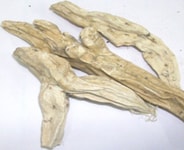 It belongs to the "Asteraceae" family and is a common herb used in the Unani system of medicine. The Latin name of the herb is Centaurea behen.
It belongs to the "Asteraceae" family and is a common herb used in the Unani system of medicine. The Latin name of the herb is Centaurea behen.
Roots of the plant contain active compounds like acetate, myristate, inulin & centurea sterol etc.
It is grown in Europe, North Africa, India, Northern Iraq and Armenia.
11. JAIPHAL – JATIPHAL - MYRISTICA FRAGRANS
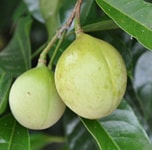 It is a huge tree with a peculiar fragrance and a yellow exudate which can be collected from its bark. Jaiphal belongs to the "Myristicaceae" family. This tree is a source of many oils, proteins, starch, minerals and resins.
It is a huge tree with a peculiar fragrance and a yellow exudate which can be collected from its bark. Jaiphal belongs to the "Myristicaceae" family. This tree is a source of many oils, proteins, starch, minerals and resins.
The aromatic oils obtained from the tree contain myristic acid, myristicin, D-pino, D –campfin, xereniol, saffrol and eugenol.
More than 72 species of the tree grow in India, Sri Lanka, Malaysia and North Eastern Australia.
The following quote beautifully explains the unique properties exhibited by Jaiphal.
Sanskrit verse –
"Jatifalasya tvak prokta jatipatri bhishagvara.
Jatipatri laghu swadu katushna ruchivarnakrit.
Kafakasa vamishavasa trishnakrimi vishapaha"
Bhavprakash nighantu – 1600 –A.D.
English translation –
"Jatiphala bark and leaves are used for medicinal purpose. Jatiphala is light, tasty, pungent, hot, appetizing, improves complexion. It pacifies kapha body energy (phlegm), cough, nausea, shortness of breath, thirst, microbial infections and toxins."
AYURVEDIC ENERGETICS OF JAIPHAL (ENGLISH AND IN HINDI)
| English | English | Hindi | Hindi |
| Taste | Bitter, Pungent | Rasa | Tikta, Katu |
| Physical property | Light, Piercing | Guna | Laghu, Tikshna |
| Potency | Hot | Virya | Ushna |
| Metabolic property | Pungent | Vipaka | Katu |
12. TAALMAKHAN – KOKILAKSHA - ASTERACANTHA LONGIFOLIA
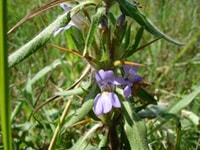 It is a small and hairy shrub growing to a height of 2 -4 feet. The Latin name of the plant is" Hygrophila spinosa" belonging to "Acanthaceae" family.
It is a small and hairy shrub growing to a height of 2 -4 feet. The Latin name of the plant is" Hygrophila spinosa" belonging to "Acanthaceae" family.
This plant prefers swamps and marshy areas growing near lakes & shrines etc. It is a plant found commonly growing all over India. In Ayurveda, it is popularly known as "Kokilaksha".
The literature from "Rajnighantu" explains in detail, the various properties and uses of Taalmakhan in the following verse.
Sanskrit verse –
"Kokilakshastu madhur sheet pittashmaripranut.
Vrishya kaphaharo balyo ruchya santarpan par."
Rajnighantu - 13th to 17th century
English translation –
"Kokilaksha is sweet, cold, prevents stone formation due to aggravated pitta body energy, aphrodisiac, pacifies kapha (phlegm), appetizing, satisfying."
AYURVEDIC ENERGETICS OF TAALMAKHAN (ENGLISH AND IN HINDI)
| English | English | Hindi | Hindi |
| Taste | Sweet | Rasa | Madhura |
| Physical property | Heavy, Smooth, Slimy | Guna | Guru, Snigdha, Pichchil |
| Potency | Cold | Virya | Sheet |
| Metabolic property | Sweet | Vipaka | Madhur |
13. KESAR – KUMKUM – CROCUS SATIVUS
 Kesar is also known as "Kumkum "in Ayurveda. In English, it is commonly known as "Saffron". The shrub belongs to "Iridaceae" family and its Latin name is Crocus sativus.
Kesar is also known as "Kumkum "in Ayurveda. In English, it is commonly known as "Saffron". The shrub belongs to "Iridaceae" family and its Latin name is Crocus sativus.
Red colored threads of the saffron spice are actually the styles and stigma of the flowers of crocus sativus.
The taste and fragrance of saffron is attributed to the chemicals picrocrocin, and safranal.
It is widely grown in India, China, Italy, Greece, Spain, Turkey and France. Iran is the world leader in the production of Saffron accounting for approximately 90% of the world's produce.
Ayurveda is an ancient system that campaigns about holistic health. The various pharmacological properties of saffron have been discussed in "Dhanvantri nighantu", a highly valued text book of Ayurveda.
Sanskrit verse -
"Kumkumam katukam tiktamushnam shleshmasamirajit.
Vran drishti shirorog vishahrit kaya kantidam"
Dhanvantri Nighantu – 10th century.
English translation -
"Kumkum is pungent, astringent, hot, pacifies kapha (phlegm) and vata (air) body energies. Relieves Wounds, eyes, brain disorders, neutralizes toxins and enhances the body complexion."
AYURVEDIC ENERGETICS OF SAFFRON (ENGLISH AND IN HINDI)
| English | English | Hindi | Hindi |
| Taste | Pungent, Bitter | Rasa | Katu, Tikta |
| Physical property | Smooth | Guna | Snigdha |
| Potency | Hot | Virya | Ushna |
| Metabolic property | Pungent | Vipaka | Katu |
WHAT ARE APHRODISIACS?
Aphrodisiacs are any kind of food drink or eatable products that can improve the sexual desire in a person. According to Ayurveda, the ancient healthcare system of India, the "Shukra Dhatu" or Semen is 7th Dhatu in the body. There are 7 Dhatu's – Ras, Rakt, Maans, Med, Asthi, majja, Shukra. For quality semen production and healthy functionality of reproductive system, it is very important to have healthy, balanced and nutritious diet. The diet can be supported with natural herbs like Asparagus, Tribulus, Wild Yams, Museli along with simple food items like milk, sugar, purified cow ghee ( Butter oil ), dry fruits etc.
There are many people who suffer from an unsatisfactory sexual life or have certain health issues like low sperm count, premature ejaculation, low vitality and erectile dysfunction. People world over are searching for natural supplements for premature ejaculation. They want solution for their problem of erectile dysfunction and low sperm count. Everybody wants healthy sex life but our dependency on artificial drugs and following a lifestyle of living away from nature has caused all the problems.
Appropriate diet and exercise play a vital role in the improvement of health and wellbeing in such people. Many of such problems are more mental than physical and can be managed by minor variations in the diet and lifestyle.
Many nutritional supplements are available nowadays that provide the body with the right kind of nutrition that helps in overall improvement of health. It is best to use natural products that are GMP certified and have the best quality ingredients used.
WHAT IS AYURVEDA?
Ayurveda is the oldest system of medicine and has consistently provided the best natural solutions to most health concerns that have affected us over the years.
Ayurvedic texts explained many natural combinations of herbs to provide support in maintaining healthy reproductive function. They improve the functioning of the "Shukra dhatu" that takes care of the male reproductive system.
COMMON SYMPTOMS OF A WEAK REPRODUCTIVE SYSTEM IN MALES
- Premature ejaculation
- Erectile dysfunction
- Low Libido
- Low Sperm Count
- Reduced stamina
- Weak muscles
- Stress
- Anxiety
- Negative approach towards life
CAN REPRODUCTIVE HEALTH BE PERMANENTLY RESTORED IN MALES?
Permanent treatment of any health condition requires a combination of the right diet, stable state of mind and appropriate supplementation besides medication. It is a variable phenomenon that differs from individual to individual. Though improvement in one's lifestyle, dietary habits, sleep pattern is highly recommended.
ARE NUTRITIONAL SUPPLEMENTS ENOUGH TO MAINTAIN SEXUAL HEALTH?
For healthy growth, a plant needs appropriate natural fertilizers, protection from pests, nutrition, right amount of sun light and water and healthy soil. Similarly our body needs right diet, proper sleep, disciplined eating habits and nutritious supplementation.
We are not sick when we are born. Slowly when we grow old, we start getting diseases. The hormones get imbalanced, the metabolism gets disturbed and if the eating habits are wrong and there is no exercise, then we develop many health issues. The herbs are like an additional source of nutrition.

